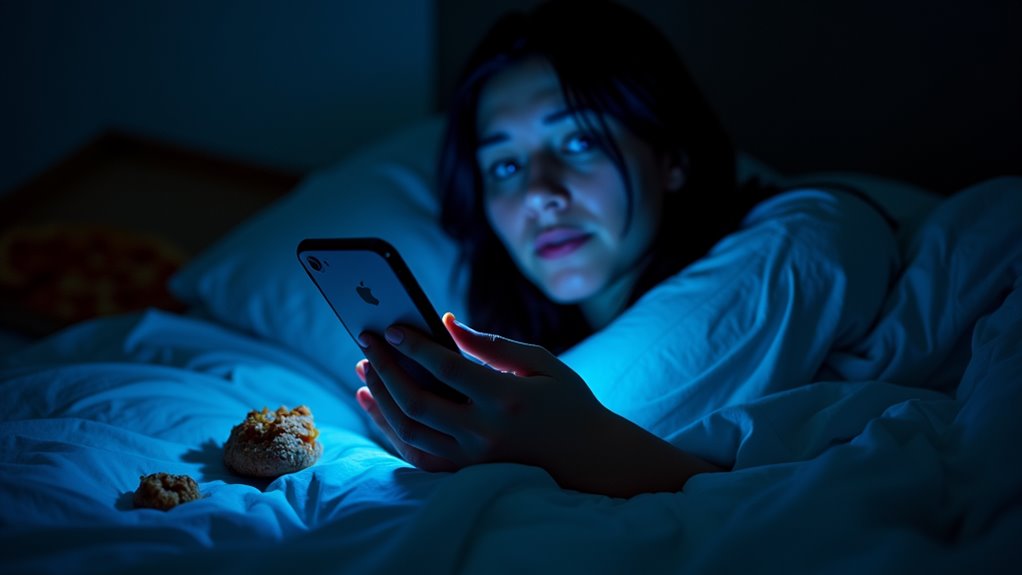Experts Reveal- The #1 Worst Habit That Makes You Fat!
You’ve probably wondered why those late-night snacks seem to stick around your waistline more than daytime meals. It’s not just your imagination – science confirms that nighttime eating is one of the biggest culprits behind unwanted weight gain. While you might think a small bedtime snack won’t hurt, your body processes food differently after dark, making those midnight munchies a serious obstacle to your health and fitness goals.
Why Late-Night Eating Is The Ultimate Weight-Gain Trap
Although late-night snacking might feel comforting after a long day, it’s one of the most destructive habits for your waistline. This worst habit that makes you fat disrupts your body’s natural circadian rhythm and metabolism, leading to unwanted weight gain.
When you eat late at night, your body isn’t prepared to properly process those calories, storing them as fat instead of burning them for energy.
You’re also more likely to reach for unhealthy comfort foods when eating late, as willpower typically diminishes throughout the day. Those cookies, chips, and ice cream become harder to resist, especially when you’re tired or stressed.
Plus, late-night eating often leads to poor sleep quality, which further throws off your hunger hormones and metabolism. By establishing an earlier cut-off time for eating, typically 2-3 hours before bedtime, you’ll align your eating patterns with your body’s natural rhythm and avoid this sneaky weight-gain trap. Additionally, late-night stress binges can exacerbate the issue, increasing cravings for high-calorie foods and leading to mindless eating.
The Science Behind Nighttime Snacking and Fat Storage
When you consume food late at night, your body’s metabolic processes shift into storage mode rather than burning mode. Your circadian rhythm, which regulates hormone production and metabolism, naturally slows down in preparation for sleep. This means those midnight snacks are more likely to be stored as fat instead of being used for energy.
Your body’s insulin sensitivity also decreases at night, making it harder to process carbohydrates properly. Combined with lower levels of physical activity, this creates the perfect storm for weight gain. Many of us who snack at night aren’t actually hungry – we’re often responding to stress, boredom, or habit.
-
Your body produces less leptin (the fullness hormone) at night, making it easier to overeat.
-
Nighttime eating disrupts your sleep quality, leading to increased cortisol and food cravings the next day.
-
Late-night meals can raise your body temperature when it should be cooling down for optimal sleep. Additionally, chronic stress can lead to excessive cortisol release, which further exacerbates fat storage, particularly around the midsection.
How Late Eating Disrupts Your Body’s Natural Rhythm
Your body operates on a finely tuned 24-hour schedule, and eating late throws this natural rhythm into chaos. When you eat late at night, you’re forcing your digestive system to work when it should be winding down and preparing for rest.
This disruption affects your circadian rhythm, the internal clock that regulates sleep, metabolism, and hormone production.
Like many others struggling with late-night eating, you mightn’t realize that your body becomes less efficient at processing food as the day progresses. Your insulin sensitivity decreases in the evening, meaning those late-night calories are more likely to be stored as fat rather than used for energy. Additionally, eating close to bedtime can interfere with the production of melatonin, your sleep hormone, making it harder to get quality rest. Poor sleep, in turn, increases hunger hormones and cravings the next day, creating a challenging cycle that can lead to weight gain. Furthermore, sleep deprivation can lead to higher ghrelin production, further exacerbating cravings for high-calorie foods.
Breaking the Late-Night Eating Cycle: Expert Strategies
Breaking free from late-night eating habits requires a combination of practical strategies and mindset shifts that experts consistently recommend. You can take control of your evening routine by implementing proven techniques that align with your body’s natural rhythm.
Start by creating a structured plan that sets you up for success and helps you join the ranks of those who’ve mastered healthy eating patterns.
-
Set a firm kitchen closing time – just like your favorite restaurant has operating hours, establish a cut-off time for eating that gives your body at least 2-3 hours before bed.
-
Replace evening snacking with calming activities – join a relaxing hobby group, practice meditation, or enjoy herbal tea with friends who share your health goals.
-
Prepare your environment for success – remove tempting foods from your evening space and stock your kitchen with healthier options that support your daytime eating schedule. Additionally, be mindful that mindless munching can lead to unwanted weight gain, further emphasizing the importance of breaking this habit.
Creating a Healthy Evening Routine for Weight Management
Establishing a consistent evening routine stands as the cornerstone of successful weight management. You’ll find that planning your evening activities helps prevent mindless eating and supports your weight loss goals.
Start by setting a firm kitchen closing time, ideally 2-3 hours before bedtime, and stick to it like your gym-savvy friends do.
Transform your evening hours into a sequence of relaxing activities that don’t revolve around food. Try taking a warm bath, practicing gentle yoga, or reading a book. You’re more likely to succeed when you replace snacking with self-care rituals that other health-conscious people swear by.
Keep a glass of water or herbal tea nearby to satisfy the urge to consume something.
Set out your workout clothes for tomorrow and prep healthy meals in advance. When you create these positive evening habits, you’ll naturally join the ranks of those who maintain their ideal weight through structured routines. Additionally, focusing on whole, unprocessed foods during your meals can greatly enhance your weight loss efforts.
Success Stories: People Who Conquered Night Eating
While many struggle with nighttime eating, countless individuals have successfully overcome this challenging habit through determination and smart strategies.
Take Sarah, who conquered her late-night snacking by implementing a strict 7 PM kitchen cutoff and replacing her evening TV time with relaxing meditation.
Or consider Mike, who broke free from midnight meals by keeping a food diary and joining an online support group of others facing similar challenges.
-
Replace nighttime eating triggers with new activities – one member started knitting, another took up evening yoga, and both found their cravings disappeared when their hands and minds stayed busy.
-
Build a community of accountability partners who’ll celebrate your victories and support you through tough nights.
-
Start small with gradual changes – successful members often began by delaying their snack time by just 15 minutes, eventually extending it until they no longer felt the urge to eat at night.

